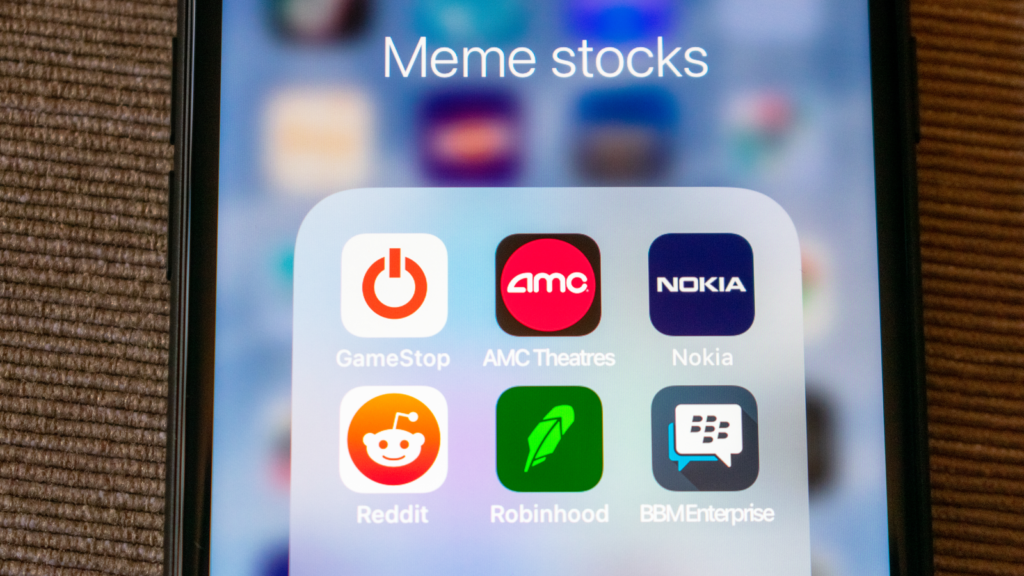Love them or hate them, meme stocks endure.
What started out as a fad on Wall Street in early 2021 continues today. It increasingly is common for a number of familiar stocks to be targeted by retail investors and their share prices pushed higher in coordinated short squeezes.
The stocks inevitably fall, but it is not uncommon for the share prices of popular meme stocks to rise or fall by 50% or more in only a few days.
Analysts and professional traders on Wall Street have moved away from meme stocks in the aftermath of the carnage caused last year. Since then they studiously avoid the most familiar names.
On the other hand, many retail investors keep looking for any excuse to squeeze the stocks and start the frenzied buying all over again. Every few months, it seems that the financial press is again filled with headlines about meme mania and the defiance of retail traders who are still looking to push stock prices “to the moon.”
With this in mind, here are three meme stocks to bet on for a comeback.
| BBBY | Bed Bath & Beyond | $10.70 |
| GME | GameStop | $30.94 |
| AMC | AMC Entertainment | $9.17 |
Bed Bath & Beyond (BBBY)

It’s been quite the wild ride lately for shares of Bed Bath & Beyond (NASDAQ:BBBY). The domestic merchandise retailer’s stock was been pumped and dumped in recent weeks by frantic retail investors.
To briefly recap the craziness, investors bid BBBY stock up 400% between July 26 and Aug. 17 on media reports that activist investor and meme stock cheerleader Ryan Cohen had taken out some bullish calls on Bed Bath shares.
However, investors quickly sold off the stock on additional reports that Cohen was, in fact, selling his entire holding of BBBY. The stock plummeted 62% in five days and is now back to trading around the same level it was at in May.
Of course, this is not the first time that BBBY stock has been pumped to new heights only to then be quickly dumped and end up back where it started. The stock has been caught in short squeezes on at least six occasions since January 2021.
Will it happen again? Chances are likely given that Bed Bath & Beyond is the type of struggling legacy retailer that’s heavily shorted on Wall Street and the meme stock crowd seems to love.
Though it is worth noting that many investors are angry with Ryan Cohen, who pocketed about $60 million when he sold his entire position in BBBY stock, accusing him of deliberately pumping and then dumping the shares. He wouldn’t be the first to do so.
GameStop (GME)

Can anyone count out GameStop (NYSE:GME) at this point? It usually only takes a faint whisper to send GME stock rising or falling.
The stock continues to experience regular highs and lows depending on news related to the video game retailer. Over the past 52 weeks, the stock has been as high as $63.92 and as low as $19.40 per share. And that price factors in a 4-for-1 stock split that took place on July 21.
While analysts continue to write off GME stock and have an average target on the shares of $17.50, representing 46% downside from the current share price of $31.66, many retail investors remain faithful to the original meme stock.
GME stock fell most recently, declining in sympathy with BBBY stock. The fact that Cohen is the chairman of GameStop didn’t help the stock as irate investors sought payback for the Bed Bath & Beyond collapse.
Prior to this recent selloff though, GME stock had risen 77% in the lead-up to the stock split in July. The share price also tends to gyrate when the company issues quarterly earnings, appoints new executives or when reports surface of significant purchases of the stock either inside or outside the company.
GameStop’s stock also tends to jump anytime comments reach a fevered pitch on the r/WallStreetBets website.
AMC Entertainment (AMC)

While the box office has recovered this summer and reports about the death of movie theaters appear to be premature, shares of AMC Entertainment (NYSE:AMC), the largest movie theater chain in the world, continue to astound and confound.
AMC stock most recently cratered, falling 63% since August 11 to $9.42 a share after the company announced plans to issue 517 million preferred shares, called “AMC Preferred Equity.”
The new stock trades under the ticker symbol “APE,” which is a nod to the retail investors that drove AMC stock higher during the pandemic. The new class of shares began trading on Aug. 22 and has the same voting rights as existing common shares.
However, the new preferred shares and their cheeky ticker symbol have not impressed Wall Street, which sees the move as nothing more than an attempt to raise money by issuing more stock and diluting the holdings of existing shareholders.
AMC shareholders had voted against the company’s proposal to issue more common stock last year, and the APE preferred stock sale is viewed as a workaround for obstinate shareholders.
After flooding the market with 517 million APE units, AMC still has around 4.5 billion shares left that it could sell to raise additional funds. Though at this point, the cupboard is starting to look a little bare.
AMC most recently reported nearly $1.2 billion in revenue for the second quarter ending June 30, which was a huge improvement from the company’s pandemic lows. While the company posted a Q2 net loss of $121.6 million, its fortunes appear to be improving.
Disclosure: On the date of publication, Joel Baglole did not have (either directly or indirectly) any positions in the securities mentioned in this article. The opinions expressed in this article are those of the writer, subject to the InvestorPlace.com Publishing Guidelines.
